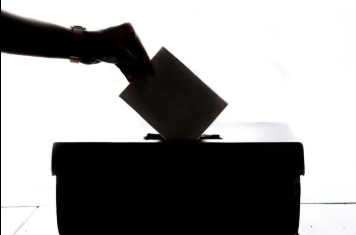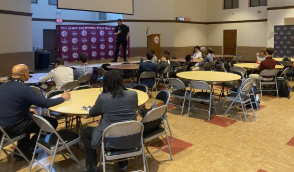Senior service is a signature part of the student experience at University of Detroit Jesuit High School. It is much more than a box to check off on the road to graduation. Instead, it’s an experiential class that walks seniors through the school’s Jesuit mission of becoming “Men for Others.” This program isn’t just about a year of community service, rather, it is a transformational opportunity for learning made manifest in real-world settings. It encourages students not only to serve but also to be deeply reflective of how to create change in other people’s lives and shape their views on social justice, empathy, and leadership.
Mrs. Tague, the Senior Service Director, clarified how the program has aligned with UDJ’s Jesuit formation goals. For many students, it starts long before their senior year, with previous experiences in service projects bringing the class together. These opportunities include Pledge Detroit, as well as individual volunteering. It is during senior year that this activity becomes part of the curriculum, a real and structured engagement with the world outside of one’s comfort zone. “Senior service,” Tague says, “is that culmination of Jesuit formation.” It is what has made the school’s motto, Ad Majórem Dei Glóriam, “for the Greater Glory of God,” vital to the school, a testament to the belief that “it is in giving that we receive.”
One of the defining features of Senior Service is its association with the Detroit community. The commitment to the city runs deep within the school. Year after year, through times of change and challenge, UDJ has remained steadfast in Detroit. “Most of our service sites are in the city,” Tague explained, “because it’s a way for us to be a good neighbor.” This focus on local engagement allows students to experience challenges and strengths that are within their community as part of a greater mission of solidarity.
Senior service is linked with another senior year requirement, the Human Dignity and Social Justice class. Tague views them as “two sides of the same coin,” since the class covers the theory behind social justice, while senior service is a chance to see it in action.
As such, students learning about human dignity and justice issues in the classroom volunteer at either a school or a hospice and experience real challenges following their theoretical learning. This synergy, therefore, allows students to link their learning to their service because, sometimes, their perspective completely changes. According to Tague, this “Changes your heart, which makes you look at the world differently.” One story of a senior epitomizes the influence of this program. Though he had heard going into it that senior service was a “blow-off,” he said quite the contrary happened, it changed his heart and outlook on life. It is this kind of development that is at the core of what this program intends to foster in its students at the respective service sites; not burdens but possibilities for learning, empathizing, and contributing meaningfully.
The process for matching students to service sites is equally thoughtful. Tague refers to it as a “multi dimensional puzzle,” weighing interests of the students, site availability and, at times, challenging students to step into new comfort zones. This year, for example, she encouraged students to consider service options that truly interested them, rather than simply selecting those that were most convenient.
It is hoped that these placements will not only suit the personality and future plans of students, but also compel them to facilitate their growth in environments they have never been in. Depending on whether students express interest in working with children, healthcare, or social services, the school strategically places the students in settings where they may make as much impact as possible and likely discover newfound career interests.
Ultimately, the UDJ definition of senior service is “you get out what you put in.” Whether working at a school, a hospice center, or a food pantry, those students that entirely invest in their service sites often find the experience to be life changing. By the spring of senior year, students gain not only hours of service but also life lessons that go well beyond high school. This journey challenges them out of their comfort zones and into the spirit of selfless giving. At UDJ, the Senior Service Program aspires to offer experiences that will help mold a new generation of compassionate leaders who are committed to service and prepared to make a difference in the world.








